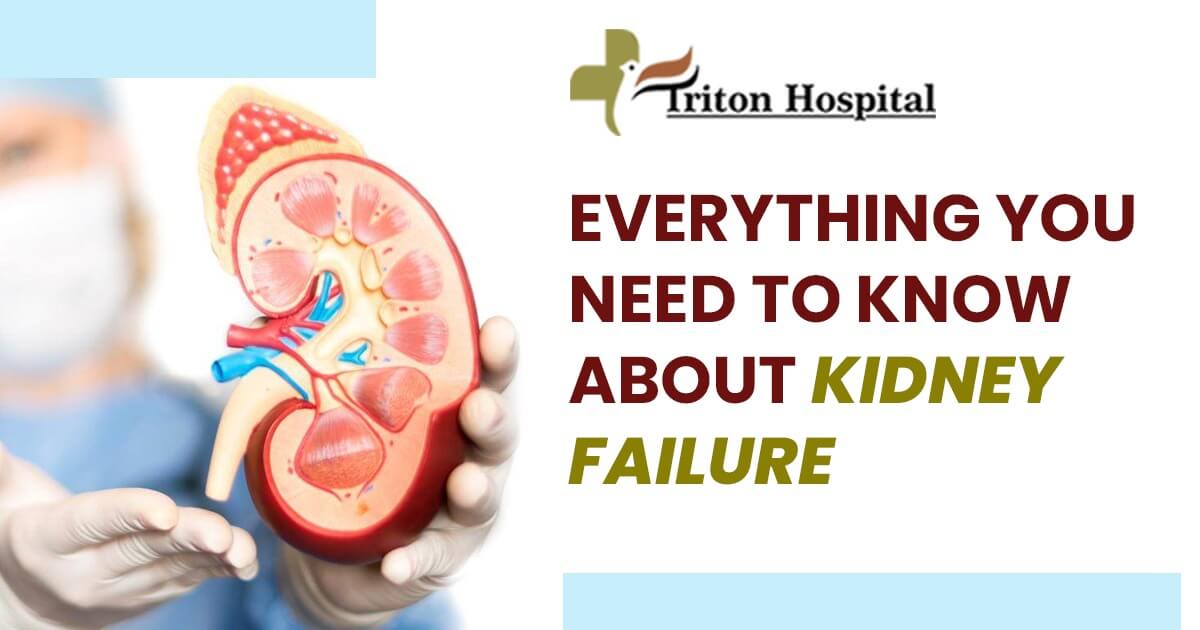
When one or both of your kidneys no longer work effectively, this condition is known as renal failure or kidney failure. Sometimes kidney failure is temporary and can come on very fast (acute). Sometimes it’s a chronic ailment (one that lasts a long period) that gradually worsens over time.
The final and most severe phase of kidney disease is called renal failure. In the absence of therapy, it is deadly. If you suffer renal failure, you can survive without therapy for a few days to a few weeks. So, if you are suffering from such a disease, you must look for the best kidney hospital near me and visit the best kidney hospital in Delhi.
What are the signs and symptoms of Kidney failure?
It is possible that the majority of people may not experience any serious symptoms until their renal disease has progressed. Nevertheless, you could have noticed that you:
· feel more lethargic and have low energy
· struggle to focus their attention properly
· suffer from a lack of appetite
· have difficulties in sleeping
· experience night-time muscular cramps and twitching
· have swollen ankles and feet
· having bags under your eyes, especially when you first get up in the morning
· skin that is flaky and itchy
· urge to urinate more frequently, particularly throughout the night
If you have any of these signs, consult your physician immediately. Contact the kidney specialist in Delhi if you are taking medication for a UTI and are still experiencing any of these symptoms.
What are the major causes of kidney failure?
Diabetes and hypertension are the major causes of chronic kidney diseases and renal failure. Uncontrolled diabetes can result in elevated blood sugar levels (hyperglycaemia). Continuously high blood sugar can harm organs, including the kidneys.
High blood pressure indicates that blood flows with power through the blood arteries of the body. Without therapy, the increased strain might cause kidney tissue damage over time. Kidney failure often develops gradually. Other CKD-related causes of kidney failure include:
· Polycystic nephropathy (PKD)
PKD is a hereditary disorder that leads to the development of fluid-filled sacs (cysts) within the kidneys.
· Glomerular disorders
Glomerular disorders impair the kidneys’ ability to filter waste.
· Lupus
Lupus is an autoimmune illness that can lead to organ damage, joint discomfort, fever, and rashes on the skin.
Kidney failure might also occur rapidly due to unforeseen causes. Acute renal failure is the abrupt loss of function of the kidneys. Within hours or days, acute renal failure may occur. It is often transient.
The following are common causes of acute renal failure:
· Autoimmune kidney disorders
· Certain pharmaceuticals
· Severe dehydration
· A urinary tract blockage
What are the treatments for kidney failure?
The therapy for kidney failure is contingent on the underlying cause as well as the severity of the condition.
In certain cases, the course of kidney disease might be slowed down by treating an underlying chronic medical condition. If your kidneys start to stop working gradually, the best nephrologists in Delhi may utilize a variety of approaches to monitor your health and keep your kidney functioning for as long as feasible. These techniques could include things like:
· Perform regular blood testin
· Checks on the patient’s blood pressure
· Medication
If your kidneys have stopped working properly, you will require therapy to live a good life. There are two primary ways that renal failure can be treated.
1. Dialysis
The process of Dialysis assists your body in cleansing its blood. And for the dialysis procedure, consider Triton hospital since it is equipped with the most advanced technology and the best nephrologists. Further, there are two distinct methods of doing Dialysis:
· Hemodialysis
During Hemodialysis, your blood is cleaned for you regularly by a machine. Most patients receive Hemodialysis between three and four times per week at a clinic or hospital.
· Dialysis of the peritoneal cavity
Peritoneal Dialysis involves inserting a catheter into the lining of the abdomen and attaching a bag containing a dialysis solution to the catheter. The solution drains back into the bag after flowing out of it and into the lining of your abdominal cavity, where it collects waste materials and excess fluids. Peritoneal Dialysis can occasionally be performed at the patient’s own home.
2. Kidney transplant
During a kidney transplant, a healthy kidney will replace the diseased kidney that you already have in your body. For this procedure, choose the best nephrologists in Delhi. A living donor or a donor who has passed away can provide the healthy kidney used in the transplant. It is possible to have a healthy life with only one functioning kidney.
Conclusion
Your kidneys serve an essential function in your body by eliminating waste and excess fluid. In renal failure, the kidneys no longer function properly. Without the correct treatment, it is deadly.
A kidney transplant or Dialysis can extend your life expectancy. In addition to drugs and a particular diet, your treatment plan may involve using certain supplements. Attend all of your scheduled appointments. If you’ve any concerns or questions about your therapies, drugs, lifestyle changes, or other treatment plans, consult the best nephrologists in Delhi.




